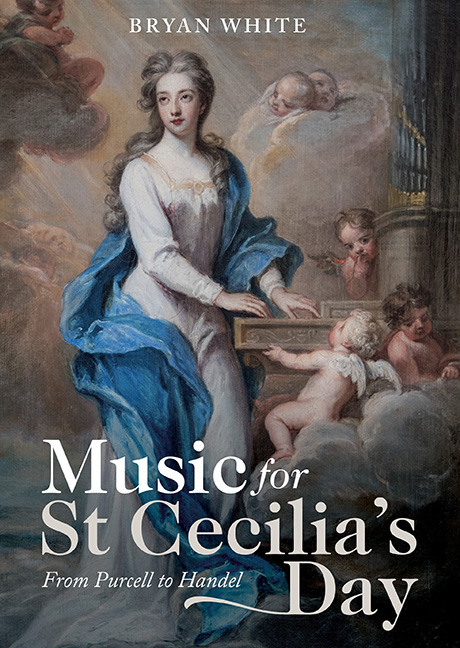Book contents
- Frontmatter
- Dedication
- Contents
- List of Plates, Tables and Music Examples
- Preface and Acknowledgements
- Note to the Reader
- Abbreviations
- Introduction
- 1 The Rise and Fall of the London Cecilian Feasts 1683–1700
- 2 ‘A splendid entertainment’: The Musical Society and the Organization of the Cecilian Feast
- 3 The London Odes 1683–1700
- 4 ‘Church-Musick Vindicated’: Services for St Cecilia's Day
- 5 Provincial Celebrations of St Cecilia's Day
- 6 Cecilian Music in London after 1700
- Bibliography
- Index
- Miscellaneous Endmatter
Preface and Acknowledgements
Published online by Cambridge University Press: 13 April 2019
- Frontmatter
- Dedication
- Contents
- List of Plates, Tables and Music Examples
- Preface and Acknowledgements
- Note to the Reader
- Abbreviations
- Introduction
- 1 The Rise and Fall of the London Cecilian Feasts 1683–1700
- 2 ‘A splendid entertainment’: The Musical Society and the Organization of the Cecilian Feast
- 3 The London Odes 1683–1700
- 4 ‘Church-Musick Vindicated’: Services for St Cecilia's Day
- 5 Provincial Celebrations of St Cecilia's Day
- 6 Cecilian Music in London after 1700
- Bibliography
- Index
- Miscellaneous Endmatter
Summary
MY first encounter with Henry Purcell's ‘Hail, bright Cecilia’ came through a class on the composer's dramatic operas that I took with Bruce Wood when I was a taught postgraduate student at University College North Wales (as it was then) in Bangor. The piece struck me very powerfully, in terms of both its music and its subject: the praise of music. I owe numerous debts to Bruce for his support in my scholarly career, but most of all for firing my interest in the music of Purcell, which provided the spark for this book. When I returned to Bangor a few years later to take up a doctoral research project on Louis Grabu's opera Albion and Albanius, I coincided for a time with Catherine Wanless, who was editing the odes of John Eccles. One of those works she edited was his Cecilian ode, a setting of Congreve's Hymn to Harmony. I organized a performance with the University Chamber Choir using her edition, which rekindled my interest in the tradition from which Eccles's and Purcell's odes arose. I am grateful to Catherine for sharing her research with me and to the School of Music at Bangor for providing the people and means to perform the Eccles ode.
My enquiry into Cecilian music was not initially planned as a book, but that is what it in time grew into. Over the many years I have worked on the project I have received significant support from the School of Music at the University of Leeds in the form of study leave and funding to carry out research to present papers on the project at conferences, and for expenses relating to the images used in this book. I have benefited from the comments and support of colleagues at numerous meetings of the Biennial International Conference on Baroque Music at which aspects of this work have been presented. I am grateful to the librarians and archivists at many institutions who have provided me with copies of material from, information about and access to the collections they oversee. I am particularly grateful to Richard Luckett, who has shared with me his extensive knowledge of St Cecilia and music, provided me with copies and transcripts of odes by Vaughan Richardson in his personal collection and commented on portions of the text.
- Type
- Chapter
- Information
- Music for St Cecilia's Day: From Purcell to Handel , pp. xiv - xvPublisher: Boydell & BrewerPrint publication year: 2019

